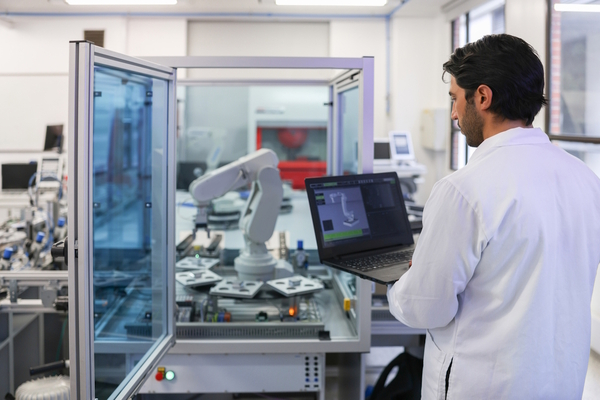Putting people at the heart of decision making

John Neilson at Sopra Steria UK discusses some of the ways that organisations can become more socially responsible, starting with putting people at the heart of every decision.
Businesses across the globe are facing the challenge of the Great Resignation. This is driven by a desire for greater flexibility in working hours and location, and for a better work-life balance.
But perhaps the most important driver is the desire to work for organisations that do more than just deliver, organisations that try to make life better. Workers want to work for businesses with a social conscience, ones that positively impact the communities within which they work.
This has served as a real wake up call for organisations, many of which need to do more in their quest towards becoming socially responsible.
Emotional and physical well-being
At the end of the day, employees are more than just employees – they are people. And they require emotional and physical well-being, to not only be happy in themselves, but also to prevent stress and burnout, and to ensure they are doing the best job possible.
Workers spend a large percentage of their lives at work. Therefore creating positive working environments where people can thrive is core to business performance and employee engagement.
To cultivate this environment, organisations need to prioritise several areas, including:
- Appropriate physical workplace environments - offices, homes and any other sites where people may work,
- Developing effective people managers,
- Offering learning and development opportunities,
- Encouraging teamwork and two-way communication, and
- Developing a good workplace culture
All of these are vital, whatever the size of the company.
Another initiative which can no longer go overlooked is that of flexible working. Allowing flexibility which is appropriate to an employee’s role and the operational needs of the company is now a must.
For larger companies boasting a range of different roles, including those which don’t allow a lot of flexibility, consultation with workers to ensure patterns suit each individual will help improve employee satisfaction.
Those businesses which have workers who need to be in the office regularly, should also look at a potential office redesign such as creating better collaboration and networking workspaces. This will help senior teams maintain the fabric and culture of the business in this hybrid world.
Other ways businesses can support their workers include providing a range of tools and programmes to actively support them mentally and physically. We know how vital good mental health is. Physical health can be overlooked within a business, yet it has been correlated with better concentration, increased mental stamina, lowered stress levels, and improved focus.
Being ethically driven
The power of purpose can’t be underestimated, and there is a strong business case for being ethically driven. It’s no longer about being ethical just for the sake of it, but because it’s the right thing to do. This is a mantra which needs to be lived and breathed by all workers, specifically senior leadership.
Research has proven many people would prefer to work for ethical companies – with a quarter of younger workers saying they would never work for organisations that profit from unsustainable practices. With this in mind, organisations need to put plans in place to drive positive change in both business and society if they aren’t already.
Part and parcel of having a strong social conscience is recognising that being inclusive and diverse is vital to being a great place to work. Inclusivity is key to not only supporting those who come from diverse or underrepresented groups but also boosting allyship.
Providing a supportive and safe environment for everyone across a business to connect, learn, and share about the cultures, perspectives, and issues of colleagues from different backgrounds increases camaraderie and empowers those who may be underrepresented.
Social value
Improving how your business creates social value can manifest in several ways, for example, “tech for good” initiatives, investing in local communities, inclusive employment policies, and supporting small and/or local businesses.
Very importantly, it is also about the social value your solutions and services deliver and how these can make a difference to people’s lives. Services that deliver social value give pride to the people delivering them.
It’s important for organisations, and those in charge of improving their social value practices, to understand there is no one size fits all approach. What works for one organisation might not work for another.
In fact, for those looking to incorporate social value into their business, it’s often best to start with what they’re good at, or where they can make the most difference, and for this to be driven by people themselves. Which aspects of social value matter most to them, do they have any particular charities or programmes they want to support, can you tap into their ideas for initiatives, etc.?
Letting people take the lead and asking them about the causes and issues they want to support drives better engagement within these programmes while ensuring workers feel included and listened to.
At the same time, social value also needs to be part and parcel of what organisations deliver, and not just internally. Delivering technology, solutions or services which improve people’s lives are core to a well-rounded social value programme and provide further value for those workers who want to make a difference.
By living these values, organisations become more valuable to their workers and customers, while also ensuring they are doing the right thing.
It’s also important to note, the most successful corporate social responsibility programmes have senior leaders who show they are committed to making a difference, rather than just creating a social value mission statement and not following through on it. Leading from the top is imperative to success.
People at the heart of decision making
Putting people at the heart of decision-making cannot be underestimated. It is already clear that companies need to work harder than they have in the past to survive and thrive while helping their people prosper.
By putting well-being first, driving ethical practices, and boosting social value initiatives, businesses can ensure their teams truly feel part of an organisation committed to making a difference.
John Neilson is Chief Executive Officer at Sopra Steria UK
Main image courtesy of iStockPhoto.com

Business Reporter Team
Related Articles
Most Viewed
Winston House, 3rd Floor, Units 306-309, 2-4 Dollis Park, London, N3 1HF
23-29 Hendon Lane, London, N3 1RT
020 8349 4363
© 2024, Lyonsdown Limited. Business Reporter® is a registered trademark of Lyonsdown Ltd. VAT registration number: 830519543





